Tag Archives: National Oceanic and Atmospheric Administration
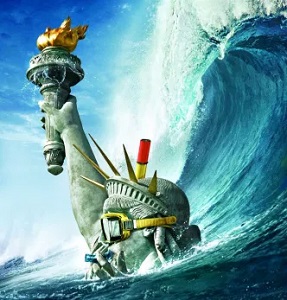
Are Temperatures and Sea Levels Rising Dangerously? Hardly
There are two widely held climate-change beliefs that are simply not accurate. The first is that there has been a statistically significant warming trend in the U.S. over the last 20 years. The second is that average ocean levels are rising alarmingly due to man-made global warming. Neither of these perspectives is true; yet both remain important, nonetheless, since both are loaded with very expensive public policy implications. To refute the first view, we turn to data generated by the National Oceanic and Atmospheric Administration (NOAA) for the relevant years under discussion. >click to read< 14:24
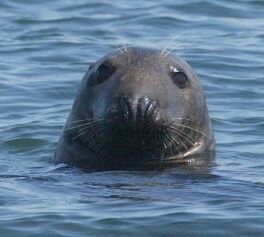
DFO working to keep U.S. markets open to northern fisheries
The Department of Fisheries and Oceans is working to ensure that fisheries in Nunavut and Nunavik will be able to export their products to markets in the United States after next year. Beginning on Jan. 1, 2022, the U.S. Marine Mammal Protection Act’s import provisions rule will take effect. Four Greenland halibut (turbot), three Arctic char fisheries, and a shrimp fishery will all need to comply. “This rule ensures that the U.S. will only accept imports of fish and fish products originating from foreign countries that have enacted management measures to reduce marine mammal bycatch”,,, DFO submitted a progress report to NOAA and proposed that three Arctic char gillnet fisheries be exempt based on their location in river estuaries, short time in the water and shallow depth. NOAA rejected the request for an exemption. >click to read< 14:00
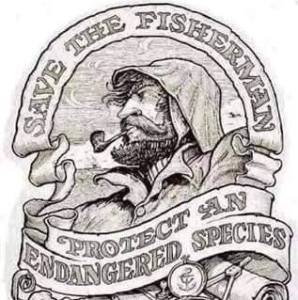
Baker Polito Administration Announces Coronavirus Disaster Relief Funding for Fishing and Seafood Industries
The Baker-Polito Administration has announced the distribution of $27.8 million in federal disaster relief funding to mitigate the financial impacts to the fishing and seafood industries from the Coronavirus COVID-19 pandemic. The Division of Marine Fisheries worked with fishing industry stakeholders to develop a plan to distribute the federal fisheries assistance, which has now been approved by the National Oceanic and Atmospheric Administration. >click to read< 11:12
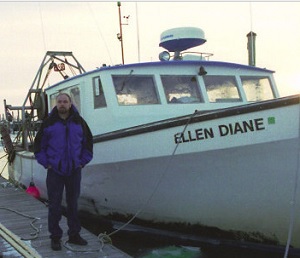
Your View: Turning fishery into police state won’t stop fraudsters like Carlos Rafael
First, I want to point out that none of this is to defend Carlos Rafael. The nicest thing he ever said about honest, small boat fishermen like me was to compare us to mosquitoes to his elephant. (“The maggots screaming on the sidelines, they’re done. They can scream all they want. Nobody can save them,”>click to read<) I do, however, think this case has one notable shortcoming in that the New York dealer who delivered his “bags of jingles” was never charged. Why? Maybe it is because enforcement used a crooked dealer as its star witness,,, by David Goethel >click to read< 22:23
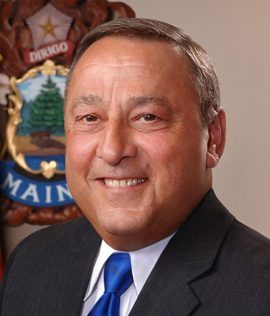
LePage appeals to Trump on lobster regulations
Former Maine Gov. Paul LePage sent a letter this week to President Trump opposing proposed regulations designed to protect endangered North Atlantic rights whales that LePage says will be detrimental to the state’s signature lobster industry. In his three-page letter, LePage called the proposal by the National Oceanic and Atmospheric Administration to reduce the number of end lines – the ropes that connect traps to buoys – by 50 percent “another federal overreach in response to big money environmentalists.” >click to read<08:05
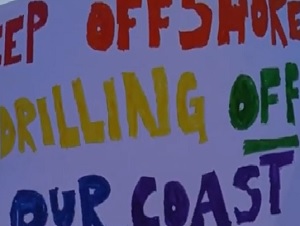
South Carolina: Local organization speaks out against seismic testing
Friday, seismic testing was given the go-ahead by the National Marine Fisheries Services, which is a part of the National Oceanic and Atmospheric Administration. Last year, the U.S. Department of Interior denied the seismic permits. They said the damage caused to marine animals and the fishing industry was not worth it.It is now a go, and Lowcountry organizations are upset because seismic testing is the first step to potentially allowing offshore drilling. “We are extremely against seismic air gun blasts,” Peg Howell, spokesperson for Stop Offshore Drilling in the Atlantic, said. >click to read<20:50
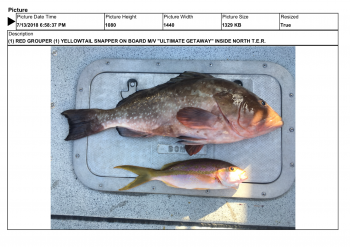
Environmental Citations Issued For Boat Captain During NOAA Environmental Research Cruise
The captain of a charter boat carrying government scientists on an environmental research cruise near the Keys has been cited for violating environmental regulations. The Ultimate Getaway is a 100-foot charter boat that takes people to the remote Tortugas, west of Key West, for diving and spearfishing trips. This month, it was chartered by the federal government for the Coral Reef Monitoring Program research cruise, which surveys reef and fish in Florida every other year. The FWC patrol saw the Ultimate Getaway at anchor inside the reserve. When they came alongside, they saw fishing poles and gear on the vessel’s stern, according to the FWC report. >click to read<11:19

Lawsuit challenges fishing methods that could threaten right whales
An environmental activist is seeking a preliminary injunction to stop the use of vertical buoy fishing lines in Massachusetts waters to protect critically endangered North Atlantic right whales. In lawsuit filed in late February in U.S. District Court in Boston, conservationist Richard Maximus Strahan of Peterborough, New Hampshire, has sued the administrator of the National Oceanic and Atmospheric Administration, the assistant administrator of the Nation Marine Fisheries Service, the secretary of the Massachusetts Office of Energy and Environmental Affairs, the director of the state Division of Massachusetts Fisheries Service, the commissioners of the Atlantic States Marine Fisheries Commission and the Massachusetts Lobstermen’s Association, as a representative of its members. Strahan wants to stop the state’s lobster association members from further lobster pot and gill net commercial fishing operations unless they can scientifically demonstrate the endangered whales and sea turtles would not be killed or injured. >click to read<19:14
Coastal Alabama Rep. slams NOAA ‘junk science’ behind shortest red snapper season ever
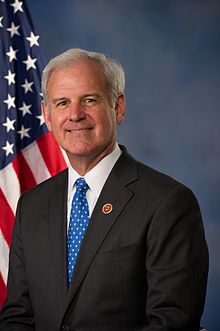 Alabama Rep. Bradley Byrne shares the frustration of most in his district when it comes to the federal government’s overregulation of red snapper fishing. According to him, Coastal Alabamians are infuriated over the announcement that the much-anticipated red snapper season will only last a pitifully short three days. He believes they have a right to be mad. “[My constituents] have every reason to be outraged, because they have a right to fish in the waters of the United States, and they’re being deprived of that right by junk science. Put junk science in, you’re going to get a bad result out, and that’s exactly what we’ve got here,” Rep. Byrne said. Every year, the National Marine Fisheries Service (NMFS), which is managed by the National Oceanic and Atmospheric Administration (NOAA), announces how long the fishing season will last based on the size and stock of red snapper fish. click here to read the story 13:45
Alabama Rep. Bradley Byrne shares the frustration of most in his district when it comes to the federal government’s overregulation of red snapper fishing. According to him, Coastal Alabamians are infuriated over the announcement that the much-anticipated red snapper season will only last a pitifully short three days. He believes they have a right to be mad. “[My constituents] have every reason to be outraged, because they have a right to fish in the waters of the United States, and they’re being deprived of that right by junk science. Put junk science in, you’re going to get a bad result out, and that’s exactly what we’ve got here,” Rep. Byrne said. Every year, the National Marine Fisheries Service (NMFS), which is managed by the National Oceanic and Atmospheric Administration (NOAA), announces how long the fishing season will last based on the size and stock of red snapper fish. click here to read the story 13:45
New England’s cod catch in nosedive
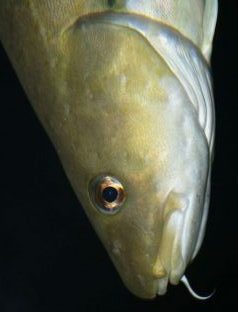 The decline of the fishery has made the U.S. reliant on foreign cod, and cod fish fillets and steaks purchased in American supermarkets and restaurants are now typically caught by Norway, Russia or Iceland in the north Atlantic. In Maine, which is home to the country’s second-largest Atlantic cod fishery, the dwindling catch has many wondering if cod fishing is a thing of the past. “It’s going to be more and more difficult for people to make this work,” said Maggie Raymond, executive director of the Associated Fisheries of Maine. State records say 2016 was historically bad for cod fishing in Maine. Fishermen brought less than 170,000 pounds of the fish to land in the state last year.,,, The National Oceanic and Atmospheric Administration released an assessment of the Gulf of Maine cod stock in 2014 that said the spawning population was at its lowest point in the history of the study of the fish. Scientists have cited years of overfishing and inhospitable environmental conditions as possible reasons for the decline. continue reading the story here 09:50
The decline of the fishery has made the U.S. reliant on foreign cod, and cod fish fillets and steaks purchased in American supermarkets and restaurants are now typically caught by Norway, Russia or Iceland in the north Atlantic. In Maine, which is home to the country’s second-largest Atlantic cod fishery, the dwindling catch has many wondering if cod fishing is a thing of the past. “It’s going to be more and more difficult for people to make this work,” said Maggie Raymond, executive director of the Associated Fisheries of Maine. State records say 2016 was historically bad for cod fishing in Maine. Fishermen brought less than 170,000 pounds of the fish to land in the state last year.,,, The National Oceanic and Atmospheric Administration released an assessment of the Gulf of Maine cod stock in 2014 that said the spawning population was at its lowest point in the history of the study of the fish. Scientists have cited years of overfishing and inhospitable environmental conditions as possible reasons for the decline. continue reading the story here 09:50
Boris Worm The Jellyfish Guy says New York turns into some kind of modern Venice with Sea Level Rise
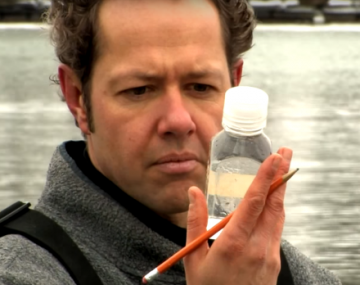 Coastal communities, including those in Newfoundland and Labrador, could be drowned by significant sea level rise before the end of the century according to a new report released by the U.S. government (NOAA). Boris Worm, a marine scientist at Dalhousie University in Halifax, N.S., says a report by the American National Oceanic and Atmospheric Administration suggests sea levels could rise by 2.5 metres by the year 2100. “They were asking the question, how will any given amount of sea level rise be felt in the U.S. and what are the likely scenarios for sea level rise given current emissions,” he told CBC Radio’s The Broadcast. “They’ve come up with a range of projections, and the notable thing here is that that range of projections is a lot larger than it used to be.” Worm said less than a decade ago, the expectation was between one and two feet of sea level rise by the end of the century. “They’ve now corrected this and said it’s going to be a lot more, and it could be up to 8.2 feet,” he said. “If that comes true, it means New York turns into some kind of modern Venice, Venice turns to some kind of Atlantis, and I don’t know what it means for Newfoundland … it really means a complete rethinking of how we live close to the coast.” Read the story here 13:45
Coastal communities, including those in Newfoundland and Labrador, could be drowned by significant sea level rise before the end of the century according to a new report released by the U.S. government (NOAA). Boris Worm, a marine scientist at Dalhousie University in Halifax, N.S., says a report by the American National Oceanic and Atmospheric Administration suggests sea levels could rise by 2.5 metres by the year 2100. “They were asking the question, how will any given amount of sea level rise be felt in the U.S. and what are the likely scenarios for sea level rise given current emissions,” he told CBC Radio’s The Broadcast. “They’ve come up with a range of projections, and the notable thing here is that that range of projections is a lot larger than it used to be.” Worm said less than a decade ago, the expectation was between one and two feet of sea level rise by the end of the century. “They’ve now corrected this and said it’s going to be a lot more, and it could be up to 8.2 feet,” he said. “If that comes true, it means New York turns into some kind of modern Venice, Venice turns to some kind of Atlantis, and I don’t know what it means for Newfoundland … it really means a complete rethinking of how we live close to the coast.” Read the story here 13:45
American Samoan Governor Lolo Moliga gets tough with NOAA
American Samoan Gov. 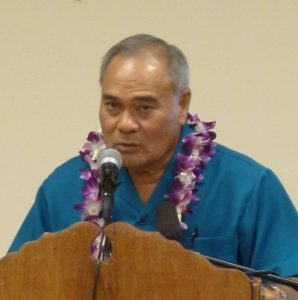 called a spade a spade when he met with officials from the National Marine Sanctuary Foundation visiting the territory last week. Speaking at Friday’s cabinet meeting, the first for the new administration, the governor said he told officials from the National Oceanic and Atmospheric Administration that their local office, is just that — an office, and it cannot dictate what American Samoa can and cannot do. He said it’s not that American Samoa is against conservation, but it’s the way that the federal government has gone about the takeover of local waters included in the sanctuary that he has a problem with. The governor said he told the feds that American Samioa is prepared to fight for ownership of its resources in the lawsuit now before the U.S. District Court of Honolulu, which goes to trial this week. Link 09:38
called a spade a spade when he met with officials from the National Marine Sanctuary Foundation visiting the territory last week. Speaking at Friday’s cabinet meeting, the first for the new administration, the governor said he told officials from the National Oceanic and Atmospheric Administration that their local office, is just that — an office, and it cannot dictate what American Samoa can and cannot do. He said it’s not that American Samoa is against conservation, but it’s the way that the federal government has gone about the takeover of local waters included in the sanctuary that he has a problem with. The governor said he told the feds that American Samioa is prepared to fight for ownership of its resources in the lawsuit now before the U.S. District Court of Honolulu, which goes to trial this week. Link 09:38
NOAA Quietly Deletes Apology For Sharing Anti-Trump Facebook Post
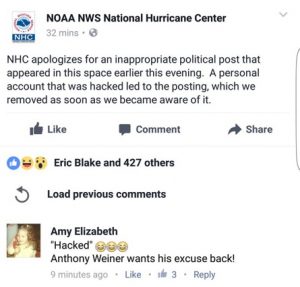 A branch of the National Oceanic and Atmospheric Administration (NOAA) responsible for tracking hurricanes apologized Saturday for sharing a Facebook post critical of President Trump. The National Hurricane Center (NHC), rather surprisingly, deleted the apology from its Facebook page, which claimed a “hacked” personal account was responsible for sharing a post by Vermont Sen. Bernie Sanders. NHC’s Facebook page shared a Sanders post highlighting Saturday’s march in Washington, D.C., in protest to Trump taking office. NHC then quietly deleted off its Facebook account, but not before meteorologist Dr. Ryan Maue captured a screenshot. Read the rest here 10:59
A branch of the National Oceanic and Atmospheric Administration (NOAA) responsible for tracking hurricanes apologized Saturday for sharing a Facebook post critical of President Trump. The National Hurricane Center (NHC), rather surprisingly, deleted the apology from its Facebook page, which claimed a “hacked” personal account was responsible for sharing a post by Vermont Sen. Bernie Sanders. NHC’s Facebook page shared a Sanders post highlighting Saturday’s march in Washington, D.C., in protest to Trump taking office. NHC then quietly deleted off its Facebook account, but not before meteorologist Dr. Ryan Maue captured a screenshot. Read the rest here 10:59
Congressmen Seek Investigation Of Hawaii Fishing Practices
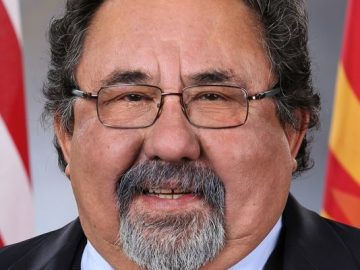 Four Democratic congressmen have written to officials at the U.S. Coast Guard and the National Oceanic and Atmospheric Administration claiming that Hawaii’s longline fishing fleet is operating illegally by employing — and in some cases possibly abusing — foreign fishermen. The congressmen said fishing boat owners who are not in “compliance with the law” should not be allowed to sell their products. Arizona Rep. Raul Grijalva’s staff convened a forum about the matter on Capitol Hill last week. Activists at the event, who described what was happening as modern-day slavery, advocated a boycott of tuna until the alleged abuses stop. “This illegal activity does not represent American values and has dealt a blow to U.S. credibility as a global leader in fighting (illegal, unreported and unregulated) fishing and human trafficking,” the congressmen wrote. WHERE IS THE PROOF! Read the rest here 10:41
Four Democratic congressmen have written to officials at the U.S. Coast Guard and the National Oceanic and Atmospheric Administration claiming that Hawaii’s longline fishing fleet is operating illegally by employing — and in some cases possibly abusing — foreign fishermen. The congressmen said fishing boat owners who are not in “compliance with the law” should not be allowed to sell their products. Arizona Rep. Raul Grijalva’s staff convened a forum about the matter on Capitol Hill last week. Activists at the event, who described what was happening as modern-day slavery, advocated a boycott of tuna until the alleged abuses stop. “This illegal activity does not represent American values and has dealt a blow to U.S. credibility as a global leader in fighting (illegal, unreported and unregulated) fishing and human trafficking,” the congressmen wrote. WHERE IS THE PROOF! Read the rest here 10:41
Editorial: Fishing essential in monetary and cultural ways
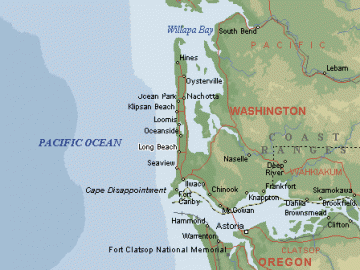 For fishing communities, the National Oceanic and Atmospheric Administration’s annual publication about commercial landings makes great reading. As we’ve observed in the past, “Fisheries of the United States” is interesting here in much the same way crop reports are a topic of fascination for farmers. Make no bones about it: Irrespective of decades of impressive economic diversification, the Lower Columbia and nearby places like Garibaldi, Newport, Willapa Bay and Westport, Washington, are fishing communities in essential cultural and monetary ways. Fishing dollars bounce around coastal towns and bolster the business climate in much the way fish fertilizer makes plants prosper. Analysis of multiyear trends points out some disturbing news about the strength of commercial fisheries on the Lower Columbia. The 2015 edition of the annual fisheries compendium from the National Marine Fisheries Service finds Astoria-area landings at something of a low ebb. Read the editorial here 09:10
For fishing communities, the National Oceanic and Atmospheric Administration’s annual publication about commercial landings makes great reading. As we’ve observed in the past, “Fisheries of the United States” is interesting here in much the same way crop reports are a topic of fascination for farmers. Make no bones about it: Irrespective of decades of impressive economic diversification, the Lower Columbia and nearby places like Garibaldi, Newport, Willapa Bay and Westport, Washington, are fishing communities in essential cultural and monetary ways. Fishing dollars bounce around coastal towns and bolster the business climate in much the way fish fertilizer makes plants prosper. Analysis of multiyear trends points out some disturbing news about the strength of commercial fisheries on the Lower Columbia. The 2015 edition of the annual fisheries compendium from the National Marine Fisheries Service finds Astoria-area landings at something of a low ebb. Read the editorial here 09:10
How Cat Poop Is Killing the Endangered Hawaiian Monk Seals
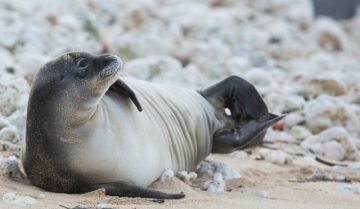 Colonies of feral cats are thriving in neighborhoods all over Oahu, from the University of Hawaii’s Manoa campus to Waianae’s homeless encampment, in alleys behind hotels and along trails in the mountains. But it’s not the smells or caterwauling that is of primary concern to scientists. The biggest issue, federal and state scientists said, is the cats’ unique ability to spread toxoplasmosis, a parasitic disease that has killed at least eight critically endangered Hawaiian monk seals, two spinner dolphins, nene geese and native birds over the past 15 years. The problem is pitting scientists trying to save threatened marine mammals and other creatures against animal rights activists trying to save abandoned cats. “You need to stop it at the source, and that means preventing cats from defecating in the environment, whether it’s in the hills or on the beaches,” said Michelle Barbieri, a wildlife veterinary medical officer with the National Oceanic and Atmospheric Administration’s Hawaiian Monk Seal Research Program. Read the story here 10:24
Colonies of feral cats are thriving in neighborhoods all over Oahu, from the University of Hawaii’s Manoa campus to Waianae’s homeless encampment, in alleys behind hotels and along trails in the mountains. But it’s not the smells or caterwauling that is of primary concern to scientists. The biggest issue, federal and state scientists said, is the cats’ unique ability to spread toxoplasmosis, a parasitic disease that has killed at least eight critically endangered Hawaiian monk seals, two spinner dolphins, nene geese and native birds over the past 15 years. The problem is pitting scientists trying to save threatened marine mammals and other creatures against animal rights activists trying to save abandoned cats. “You need to stop it at the source, and that means preventing cats from defecating in the environment, whether it’s in the hills or on the beaches,” said Michelle Barbieri, a wildlife veterinary medical officer with the National Oceanic and Atmospheric Administration’s Hawaiian Monk Seal Research Program. Read the story here 10:24
Author Alan Stein Says US Commerce FOIA Lawsuit Yielded Results
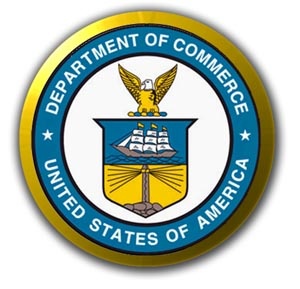 A federal lawsuit moved the U.S. Department of Commerce to hand over thousands of pages of withheld documents needed to write a book, the lawyer of an environmental activist and author said Thursday. Writer, fisherman and environmental activist Alan Stein sued the Commerce Department under the Freedom of Information and Administrative Procedures Acts in July 2015. He claimed the department and two of its agencies — the National Oceanic and Atmospheric Administration and the Office of the Inspector General — had stonewalled his requests for documents he needed for a book he was writing. Last year, Stein told Courthouse News (click here) the planned book required materials from an investigation of Arne Fuglvog, a former fishing vessel operator and fisheries official who spent time in prison for making false statements in fishing quota reports. Read the rest here 08:12 Read The NOAA Oversight Project – Fisherman’s FOIA’s Squeeze NOAA, to see the that James Balsiger, the acting head of the National Marine Fisheries Service, was going to be replaced by fisherman/ Senate staffer Arne Fuglvog who favored catch shares or scientist Brian Rothschild who did not. Click here
A federal lawsuit moved the U.S. Department of Commerce to hand over thousands of pages of withheld documents needed to write a book, the lawyer of an environmental activist and author said Thursday. Writer, fisherman and environmental activist Alan Stein sued the Commerce Department under the Freedom of Information and Administrative Procedures Acts in July 2015. He claimed the department and two of its agencies — the National Oceanic and Atmospheric Administration and the Office of the Inspector General — had stonewalled his requests for documents he needed for a book he was writing. Last year, Stein told Courthouse News (click here) the planned book required materials from an investigation of Arne Fuglvog, a former fishing vessel operator and fisheries official who spent time in prison for making false statements in fishing quota reports. Read the rest here 08:12 Read The NOAA Oversight Project – Fisherman’s FOIA’s Squeeze NOAA, to see the that James Balsiger, the acting head of the National Marine Fisheries Service, was going to be replaced by fisherman/ Senate staffer Arne Fuglvog who favored catch shares or scientist Brian Rothschild who did not. Click here
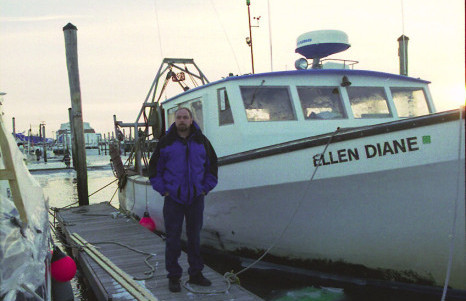
Court Rules Against Local Fishermen, Upholds Job-Killing Government Mandate
Today, the United States District Court for the District of New Hampshire dismissed the lawsuit filed by Plaintiffs David Goethel and Northeast Fishery Sector 13 against the U.S. Department of Commerce. In December 2015, the Department of Commerce ordered that fishermen who fish for cod, flounder and certain other fish in the Northeast United States not only must carry National Oceanic and Atmospheric Administration (“NOAA”) enforcement contractors known as “at-sea monitors” on their vessels during fishing trips, but must pay out-of-pocket for the cost of those monitors. This “industry funding” requirement would devastate the Northeast fishing industry, at the price of many jobs and livelihoods. The District Court’s order allows that requirement to remain in place. The Court found that the fishermen’s suit was untimely and that the requirement that monitors be funded by the fishermen was authorized by law. “I am very disappointed by this decision,” said Goethel. “I’ve made a living fishing in New England for more than 30 years, but I can’t afford to fish if I have to pay for at-sea monitors. I’m grateful to Cause of Action Institute for joining the fight, and I hope that the rule of law will win in the end.” “The fishermen in my sector can’t sustain this industry funding requirement,” said Northeast Fishery Sector 13 Manager John Haran. “They’ll have to try other fisheries, if they can keep fishing at all.” “While we respect the District Court and its decision, it appears that decision is contrary to the law and facts,” said Alfred J. Lechner, Jr., President and CEO of Cause of Action Institute and a former federal judge. “In the end, the federal government is overextending its regulatory power and is destroying an industry. We intend to study the decision and consider further action.” link 18:55
California fishing groups unite to fight offshore monuments that prohibit commercial fishing
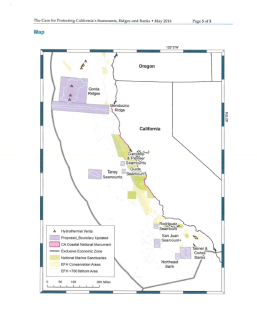 July 7, 2016 — A collection of more than 40 West Coast commercial and recreational fishing groups, working in conjunction with the National Coalition for Fishing Communities, has written to the White House, the Secretaries of Commerce and Interior, and officials in the National Oceanic and Atmospheric Administration, opposing the proposed designation of marine monuments off the coast of California that prohibit commercial fishing…The letter is in direct response to a recent proposal calling on President Obama to declare virtually all (SRB’s) off the California coast as National Monuments using his executive authority under the Antiquities Act. Read the rest here – Read the letter here 16:28
July 7, 2016 — A collection of more than 40 West Coast commercial and recreational fishing groups, working in conjunction with the National Coalition for Fishing Communities, has written to the White House, the Secretaries of Commerce and Interior, and officials in the National Oceanic and Atmospheric Administration, opposing the proposed designation of marine monuments off the coast of California that prohibit commercial fishing…The letter is in direct response to a recent proposal calling on President Obama to declare virtually all (SRB’s) off the California coast as National Monuments using his executive authority under the Antiquities Act. Read the rest here – Read the letter here 16:28
Wildlife cops leery of ‘Finding Dory’ film – concerns of increased poaching in Keys National Marine Sanctuary
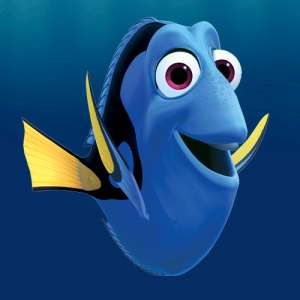 Over the last few years, federal law enforcement have arrested and convicted a slew of aquarium wildlife collectors in an operation dubbed “Operation Rock Bottom.” The Florida Keys National Marine Sanctuary and the reef are home to some of the most desirable tropical fish, coral, sharks and other wildlife for saltwater aquarium enthusiasts. Though the industry is regulated by state and federal law, the lure of quick and easy cash tempts traders to poach. Enter “Finding Nemo.” More than a decade ago, when Disney’s “Finding Nemo” animated film was released, law enforcement — mainly U.S. Fish and Wildlife Service and the National Oceanic and Atmospheric Administration — saw a spike in the collection of species made popular in the movie. Read the story here 12:12
Over the last few years, federal law enforcement have arrested and convicted a slew of aquarium wildlife collectors in an operation dubbed “Operation Rock Bottom.” The Florida Keys National Marine Sanctuary and the reef are home to some of the most desirable tropical fish, coral, sharks and other wildlife for saltwater aquarium enthusiasts. Though the industry is regulated by state and federal law, the lure of quick and easy cash tempts traders to poach. Enter “Finding Nemo.” More than a decade ago, when Disney’s “Finding Nemo” animated film was released, law enforcement — mainly U.S. Fish and Wildlife Service and the National Oceanic and Atmospheric Administration — saw a spike in the collection of species made popular in the movie. Read the story here 12:12
South Pacific Tuna Treaty renegotiation session concluded successfully
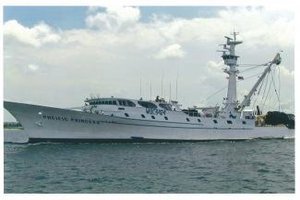 The most recent South Pacific Tuna Treaty renegotiation session concluded successfully on Saturday, June 25, 2016. Negotiators from the United States and representatives of the 16 Pacific Island parties reached agreement in principle on changes to the 27-year-old Tuna Treaty and the terms of fishing access for the U.S. purse seine fleet to Pacific Island waters through 2022. The proposed agreement would establish more flexible procedures for commercial cooperation between U.S. industry and Pacific Island parties. The outcome reflects strong cooperation between the parties to the Treaty and relevant stakeholders, and a mutual commitment to the broader positive relationship between the United States and the Pacific Island region. Read the rest here 09:46
The most recent South Pacific Tuna Treaty renegotiation session concluded successfully on Saturday, June 25, 2016. Negotiators from the United States and representatives of the 16 Pacific Island parties reached agreement in principle on changes to the 27-year-old Tuna Treaty and the terms of fishing access for the U.S. purse seine fleet to Pacific Island waters through 2022. The proposed agreement would establish more flexible procedures for commercial cooperation between U.S. industry and Pacific Island parties. The outcome reflects strong cooperation between the parties to the Treaty and relevant stakeholders, and a mutual commitment to the broader positive relationship between the United States and the Pacific Island region. Read the rest here 09:46
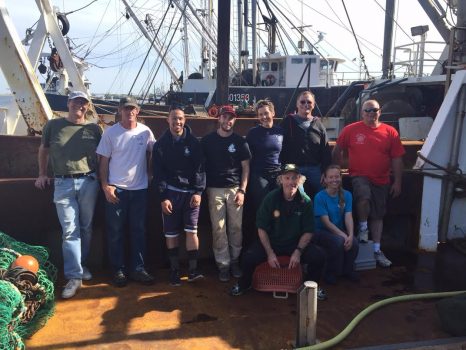
Gloucester – Fishermen, scientists to assess stock
The most incendiary divide between groundfishermen and fishing regulators in the past two years has been the discrepancy between what NOAA Fisheries says its stock assessments show and what fishermen are seeing on the water. The groundfish assessments by the National Oceanic and Atmospheric Administration — particularly for the iconic Gulf of Maine cod stock and certain flounders — have been uniformly dire, leading to the virtual shuttering of cod fishing in the Gulf of Maine and scant quotas for other species. Fishermen — including commercial groundfishermen, charter captains and even lobstermen — paint a very different portrait of what they are seeing on a daily basis: cod, cod everywhere, and not a one they can catch. On June 20, the city’s Economic Development and Industrial Corporation and fishing stakeholders will host a presentation by a team of University of Massachusetts scientists on their current findings and methodology for fish population counting in the Gulf of Maine. Read the rest here 10:09
Scallop Survey halted – R/V Hugh R. Sharp Losing the HabCam will create uncertainty in the assessment
 Shortly after dawn last Friday, the R/V Hugh R. Sharp was towing a sophisticated array of sensors and cameras along the bottom of the Atlantic Ocean. Then suddenly, the research vessel shuddered. Within seconds, the line went slack, and the team of scientists and volunteers realized the $450,000 camera system was lost, somewhere off the Virginia coast. Officials at the National Oceanic and Atmospheric Administration said they believe the cable connecting to the camera system, known as HabCam, snagged on the remains of the Bow Mariner, a well-known wreck in the area. “This will create uncertainty in the scallop assessment, meaning there’s a greater chance that we’ll catch too few scallops, which will be a short-term loss, or too many, which will be a long-term loss,” said Drew Minkiewicz, an attorney for the Fisheries Survival Fund, a trade group that represents scallopers throughout the Northeast. Read the rest here 10:12
Shortly after dawn last Friday, the R/V Hugh R. Sharp was towing a sophisticated array of sensors and cameras along the bottom of the Atlantic Ocean. Then suddenly, the research vessel shuddered. Within seconds, the line went slack, and the team of scientists and volunteers realized the $450,000 camera system was lost, somewhere off the Virginia coast. Officials at the National Oceanic and Atmospheric Administration said they believe the cable connecting to the camera system, known as HabCam, snagged on the remains of the Bow Mariner, a well-known wreck in the area. “This will create uncertainty in the scallop assessment, meaning there’s a greater chance that we’ll catch too few scallops, which will be a short-term loss, or too many, which will be a long-term loss,” said Drew Minkiewicz, an attorney for the Fisheries Survival Fund, a trade group that represents scallopers throughout the Northeast. Read the rest here 10:12
Northeast Regional Planning Body (RPB) releases draft Northeast Regional Ocean Plan
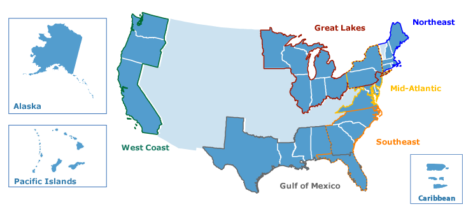 The Northeast Regional Planning Body (RPB) is proud to release the draft Northeast Regional Ocean Plan for public review and comment. Several years of public engagement, scientific study and data analysis, and collaboration has led to this draft, and the RPB looks forward to hearing the feedback of everyone who is interested in the future of New England’s ocean and its resources. The RPB wants your feedback on this draft Plan. The public comment deadline is July 25, 2016, and you can comment on each chapter electronically at each chapter landing page, in-person at any of our upcoming public comment meetings, through the comment form below, or by submitting written comments to: Betsy Nicholson, NE RPB Federal Co-lead National Oceanic and Atmospheric Administration National Marine Fisheries Service, Northeast Regional Office 55 Great Republic Drive Gloucester, MA 01930-2276. You may also provide comments by sending an e-mail to: [email protected]. Here it is, all 198 pages of it click here 17:36
The Northeast Regional Planning Body (RPB) is proud to release the draft Northeast Regional Ocean Plan for public review and comment. Several years of public engagement, scientific study and data analysis, and collaboration has led to this draft, and the RPB looks forward to hearing the feedback of everyone who is interested in the future of New England’s ocean and its resources. The RPB wants your feedback on this draft Plan. The public comment deadline is July 25, 2016, and you can comment on each chapter electronically at each chapter landing page, in-person at any of our upcoming public comment meetings, through the comment form below, or by submitting written comments to: Betsy Nicholson, NE RPB Federal Co-lead National Oceanic and Atmospheric Administration National Marine Fisheries Service, Northeast Regional Office 55 Great Republic Drive Gloucester, MA 01930-2276. You may also provide comments by sending an e-mail to: [email protected]. Here it is, all 198 pages of it click here 17:36
Ocean acidification: yet another wobbly pillar of climate alarmism
 Last year, no fewer than 600 academic papers were published on the subject, so it must be serious, right? First referenced in a peer-reviewed study in Nature in 2003, it has since been endorsed by scientists from numerous learned institutions including the Royal Society, the National Oceanic and Atmospheric Administration and the IPCC. Even the great David Attenborough — presenter of the Great Barrier Reef series — has vouched for its authenticity,,, Howard Browman, a marine scientist for 35 years, has published a review in the ICES Journal of Marine Science of all the papers published on the subject. His verdict could hardly be more damning. Read the article here 09:51
Last year, no fewer than 600 academic papers were published on the subject, so it must be serious, right? First referenced in a peer-reviewed study in Nature in 2003, it has since been endorsed by scientists from numerous learned institutions including the Royal Society, the National Oceanic and Atmospheric Administration and the IPCC. Even the great David Attenborough — presenter of the Great Barrier Reef series — has vouched for its authenticity,,, Howard Browman, a marine scientist for 35 years, has published a review in the ICES Journal of Marine Science of all the papers published on the subject. His verdict could hardly be more damning. Read the article here 09:51
As Pacific sardine collapse worsens, scientists worry about possible ripple in the ecosystem
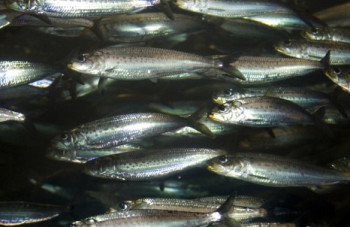 Nearly a year into a West Coast sardine fishing ban enacted to protect the collapsing population, the fish formerly worth more than $8 million to Oregon’s economy have shown no signs of a comeback. New federal research indicates numbers of the small, silvery, schooling fish have plummeted further than before the fishing moratorium, dashing any hope of lifting it in 2016. With the current sardine population hovering at 7 percent of its 2007 peak, fishermen now say they expect to wait a decade or more to revive the fishery. “I don’t want to take a pessimistic view, but I would think we’ll be shut down until 2030,” said Ryan Kapp, a Bellingham, Washington, fisherman who advises the Pacific Fishery Management Council on sardines and other fish. Read the article here 15:33
Nearly a year into a West Coast sardine fishing ban enacted to protect the collapsing population, the fish formerly worth more than $8 million to Oregon’s economy have shown no signs of a comeback. New federal research indicates numbers of the small, silvery, schooling fish have plummeted further than before the fishing moratorium, dashing any hope of lifting it in 2016. With the current sardine population hovering at 7 percent of its 2007 peak, fishermen now say they expect to wait a decade or more to revive the fishery. “I don’t want to take a pessimistic view, but I would think we’ll be shut down until 2030,” said Ryan Kapp, a Bellingham, Washington, fisherman who advises the Pacific Fishery Management Council on sardines and other fish. Read the article here 15:33
New England Fishermen face devastating cod cuts
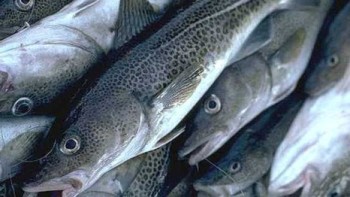 New Bedford’s commercial fishing industry — battered by last month’s arrest of magnate Carlos Rafael on federal conspiracy charges, last week’s drug raids on the waterfront and ongoing monitoring costs — took another punch to the gut this week, as government regulators proposed new cuts to cod catches that could take effect May 1. “Those cuts will be devastating to the groundfishing fleet of New Bedford, and the whole New England coast,” said John Haran, manager of groundfish Sector 13. The National Oceanic and Atmospheric Administration (NOAA), in conjunction with the New England Fishery Management Council, released a proposed update Monday to the federal management plan for the northeastern fishery. Read the rest here 20:45
New Bedford’s commercial fishing industry — battered by last month’s arrest of magnate Carlos Rafael on federal conspiracy charges, last week’s drug raids on the waterfront and ongoing monitoring costs — took another punch to the gut this week, as government regulators proposed new cuts to cod catches that could take effect May 1. “Those cuts will be devastating to the groundfishing fleet of New Bedford, and the whole New England coast,” said John Haran, manager of groundfish Sector 13. The National Oceanic and Atmospheric Administration (NOAA), in conjunction with the New England Fishery Management Council, released a proposed update Monday to the federal management plan for the northeastern fishery. Read the rest here 20:45






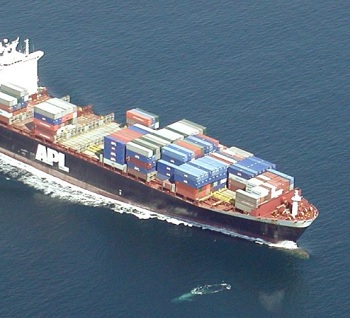
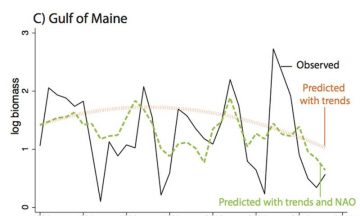



























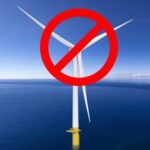
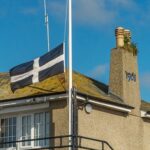
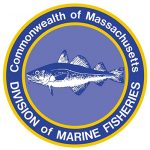

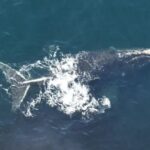
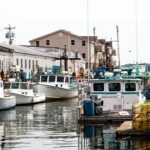
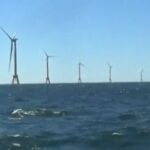
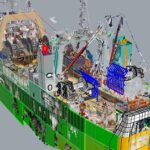
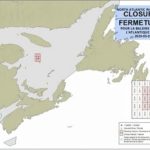



Governor Cuomo And Attorney General Underwood Demand Changes To Unfair Federal Fishing Quotas
Governor Andrew M. Cuomo and Attorney General Barbara D. Underwood today submitted comments to U.S. Commerce Secretary Wilbur Ross and demanded that the U.S. Department of Commerce, National Oceanic and Atmospheric Administration, National Marine Fisheries Service, and Mid-Atlantic Fishery Management Council repeal and replace the unfair state-by-state allocation of the annual commercial quota for summer flounder, also known as fluke. The need for equitable distribution of fluke is critically important to New York’s fishing industry and the state’s overall ocean economy. >click to read<17:27
Share this post